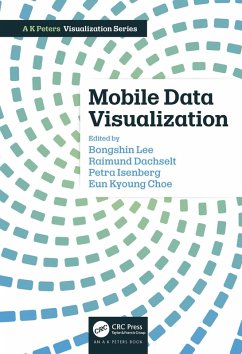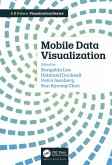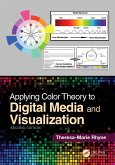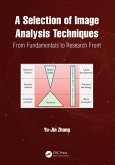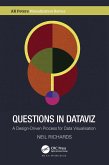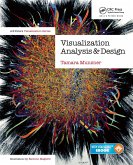Mobile Data Visualization (eBook, ePUB)
Redaktion: Lee, Bongshin; Choe, Eun Kyoung; Isenberg, Petra; Dachselt, Raimund
45,95 €
45,95 €
inkl. MwSt.
Sofort per Download lieferbar

23 °P sammeln
45,95 €
Als Download kaufen

45,95 €
inkl. MwSt.
Sofort per Download lieferbar

23 °P sammeln
Jetzt verschenken
Alle Infos zum eBook verschenken
45,95 €
inkl. MwSt.
Sofort per Download lieferbar
Alle Infos zum eBook verschenken

23 °P sammeln
Mobile Data Visualization (eBook, ePUB)
Redaktion: Lee, Bongshin; Choe, Eun Kyoung; Isenberg, Petra; Dachselt, Raimund
- Format: ePub
- Merkliste
- Auf die Merkliste
- Bewerten Bewerten
- Teilen
- Produkt teilen
- Produkterinnerung
- Produkterinnerung

Bitte loggen Sie sich zunächst in Ihr Kundenkonto ein oder registrieren Sie sich bei
bücher.de, um das eBook-Abo tolino select nutzen zu können.
Hier können Sie sich einloggen
Hier können Sie sich einloggen
Sie sind bereits eingeloggt. Klicken Sie auf 2. tolino select Abo, um fortzufahren.

Bitte loggen Sie sich zunächst in Ihr Kundenkonto ein oder registrieren Sie sich bei bücher.de, um das eBook-Abo tolino select nutzen zu können.
Mobile Data Visualization is the first book to provide an overview of how to effectively visualize, analyze, and communicate data on mobile devices. This accessible book is a valuable and rich resource for visualization designers, practitioners, researchers, and students alike.
- Geräte: eReader
- mit Kopierschutz
- eBook Hilfe
Andere Kunden interessierten sich auch für
![Mobile Data Visualization (eBook, PDF) Mobile Data Visualization (eBook, PDF)]() Mobile Data Visualization (eBook, PDF)45,95 €
Mobile Data Visualization (eBook, PDF)45,95 €![Applying Color Theory to Digital Media and Visualization (eBook, ePUB) Applying Color Theory to Digital Media and Visualization (eBook, ePUB)]() Theresa-Marie RhyneApplying Color Theory to Digital Media and Visualization (eBook, ePUB)57,95 €
Theresa-Marie RhyneApplying Color Theory to Digital Media and Visualization (eBook, ePUB)57,95 €![A Selection of Image Analysis Techniques (eBook, ePUB) A Selection of Image Analysis Techniques (eBook, ePUB)]() Yu-Jin ZhangA Selection of Image Analysis Techniques (eBook, ePUB)45,95 €
Yu-Jin ZhangA Selection of Image Analysis Techniques (eBook, ePUB)45,95 €![Data Visualization in Excel (eBook, ePUB) Data Visualization in Excel (eBook, ePUB)]() Jonathan SchwabishData Visualization in Excel (eBook, ePUB)27,95 €
Jonathan SchwabishData Visualization in Excel (eBook, ePUB)27,95 €![Questions in Dataviz (eBook, ePUB) Questions in Dataviz (eBook, ePUB)]() Neil RichardsQuestions in Dataviz (eBook, ePUB)36,95 €
Neil RichardsQuestions in Dataviz (eBook, ePUB)36,95 €![Visualization Analysis and Design (eBook, ePUB) Visualization Analysis and Design (eBook, ePUB)]() Tamara MunznerVisualization Analysis and Design (eBook, ePUB)70,95 €
Tamara MunznerVisualization Analysis and Design (eBook, ePUB)70,95 €![Information Theory Tools for Visualization (eBook, ePUB) Information Theory Tools for Visualization (eBook, ePUB)]() Min ChenInformation Theory Tools for Visualization (eBook, ePUB)47,95 €
Min ChenInformation Theory Tools for Visualization (eBook, ePUB)47,95 €-
-
-
Mobile Data Visualization is the first book to provide an overview of how to effectively visualize, analyze, and communicate data on mobile devices. This accessible book is a valuable and rich resource for visualization designers, practitioners, researchers, and students alike.
Hinweis: Dieser Artikel kann nur an eine deutsche Lieferadresse ausgeliefert werden.
Dieser Download kann aus rechtlichen Gründen nur mit Rechnungsadresse in A, B, BG, CY, CZ, D, DK, EW, E, FIN, F, GR, HR, H, IRL, I, LT, L, LR, M, NL, PL, P, R, S, SLO, SK ausgeliefert werden.
Hinweis: Dieser Artikel kann nur an eine deutsche Lieferadresse ausgeliefert werden.
Produktdetails
- Produktdetails
- Verlag: Taylor & Francis eBooks
- Seitenzahl: 346
- Erscheinungstermin: 22. Dezember 2021
- Englisch
- ISBN-13: 9781000522808
- Artikelnr.: 62912010
- Verlag: Taylor & Francis eBooks
- Seitenzahl: 346
- Erscheinungstermin: 22. Dezember 2021
- Englisch
- ISBN-13: 9781000522808
- Artikelnr.: 62912010
- Herstellerkennzeichnung Die Herstellerinformationen sind derzeit nicht verfügbar.
Bongshin Lee is a Sr. Principal Researcher in the EPIC (Extended Perception Interaction Cognition) research group, part of Human-Computer Interaction Group (HCI@MSR), at Microsoft Research. She received her PhD in Computer Science from the University of Maryland, College Park in 2006. Bongshin's research areas span data visualization, human-computer interaction, and human-data interaction, focusing on the design, development, and evaluation of novel data visualization and interaction techniques. The overarching goal of her research is to empower people to achieve their goals by leveraging data, data visualization, and technological advancements. Bongshin explores innovative ways to help people with different abilities to interact with data, by supporting easy and effective data collection, data exploration & analysis, and data-driven communication. Her most recent research endeavors include personal data visualization, data visualization on mobile devices, inclusive data visualization and multimodal interaction for data visualization. She is a member of the IEEE Visualization Academy and the IEEE Visualization Executive Committee. Raimund Dachselt is a Full Professor of Computer Science at the Technische Universität Dresden, Germany. Since 2012, he leads the Interactive Media Lab Dresden at the Faculty of Computer Science. He received his PhD in 2004 from TU Dresden and was Professor for User Interface Engineering at the University of Magdeburg from 2007 to 2012. His research interests are at the intersection of natural, multimodal human computer interaction (HCI) and data visualization. He worked extensively in the area of interactive surfaces from smartwatches over tabletops to wall-sized displays and expanded the scope to Mixed Reality interfaces for immersive data analysis. He contributed several novel interface approaches for information visualization. He has co-authored more than 220 peer-reviewed publications and two major German HCI textbooks and received several Best Paper Awards at leading conferences. He has co-organized 17 international workshops at ACM and IEEE conferences, is the head of the ACM ISS steering committee and repeatedly served in numerous chairing and organizational roles as well as a PC member for international conferences. Petra Isenberg is a research scientist at Inria, Saclay, France in the Aviz team and part of the Computer Science Laboratory of University Paris-Saclay (LISN). Prior to joining Inria, she received her PhD from the University of Calgary in 2010 on collaborative information visualization. Petra also holds a Diplom-engineer degree in Computational Visualistics from the University of Magdeburg. Her main research areas are visualization and visual analytics with a focus on non-desktop devices, interaction, and evaluation. She is particularly interested in exploring how people can most effectively work together when analyzing large and complex data sets on novel display technology such as small touch-screens, mobile devices, and wall displays, or tabletops. Petra is associate editor-in-chief at IEEE CG&A, associate editor of the IEEE Transactions on Visualization and Computer Graphics, has served on many organizing committee roles in various conferences, and has been the co-chair of the biennial Beliv workshop from 2012-2018. Eun Kyoung Choe is an Associate Professor in the College of Information Studies at the University of Maryland, College Park. She received her PhD in Information Science from University of Washington, MS in Information Management and Systems from University of California, Berkeley, and BS in Industrial Design from KAIST. Her work sits at the intersection of HCI, Ubiquitous Computing, and Personal Informatics. With an overarching goal of empowering individuals, she examines some of the major challenges people face in leveraging personal data, such as data collection, data exploration, and data sharing. Drawing insights from formative studies, she designs novel systems to support personalized data collection and multimodal data exploration for people to interact with data. Her work has been funded by the National Science Foundation, National Institute of Health, and Microsoft Research. She has been serving on the editorial boards of PACM IMWUT and Foundations and Trends in Human-Computer Interaction, and as a subcommittee chair for CHI Health (2020-2021).
Preface
Editors
Contributors
Acknowledgements
Introduction to Mobile Data Visualization
Responsive Visualization Design for Mobile Devices
Interacting with Visualization on Mobile Devices
3D Mobile Data Visualization
Characterizing Glanceable Visualizations: From Perception to Behavior Change
Evaluating Mobile Visualizations
Challenges in Everyday Use of Mobile Visualizations
Mobile Visualization Design: An Ideation Method to Try
Reflections on Ubiquitous Visualization
Index
Editors
Contributors
Acknowledgements
Introduction to Mobile Data Visualization
Responsive Visualization Design for Mobile Devices
Interacting with Visualization on Mobile Devices
3D Mobile Data Visualization
Characterizing Glanceable Visualizations: From Perception to Behavior Change
Evaluating Mobile Visualizations
Challenges in Everyday Use of Mobile Visualizations
Mobile Visualization Design: An Ideation Method to Try
Reflections on Ubiquitous Visualization
Index
Preface
Editors
Contributors
Acknowledgements
Introduction to Mobile Data Visualization
Responsive Visualization Design for Mobile Devices
Interacting with Visualization on Mobile Devices
3D Mobile Data Visualization
Characterizing Glanceable Visualizations: From Perception to Behavior Change
Evaluating Mobile Visualizations
Challenges in Everyday Use of Mobile Visualizations
Mobile Visualization Design: An Ideation Method to Try
Reflections on Ubiquitous Visualization
Index
Editors
Contributors
Acknowledgements
Introduction to Mobile Data Visualization
Responsive Visualization Design for Mobile Devices
Interacting with Visualization on Mobile Devices
3D Mobile Data Visualization
Characterizing Glanceable Visualizations: From Perception to Behavior Change
Evaluating Mobile Visualizations
Challenges in Everyday Use of Mobile Visualizations
Mobile Visualization Design: An Ideation Method to Try
Reflections on Ubiquitous Visualization
Index
